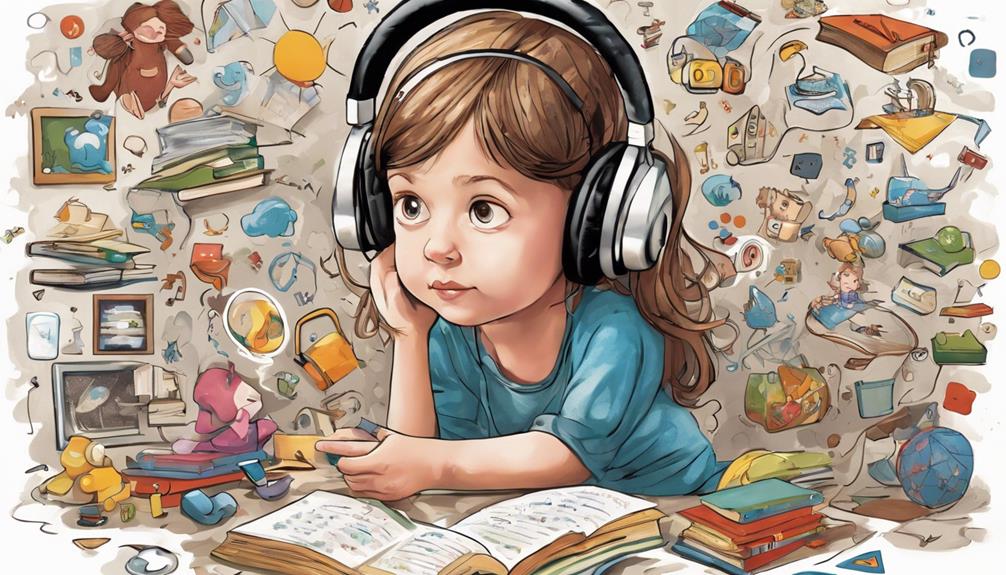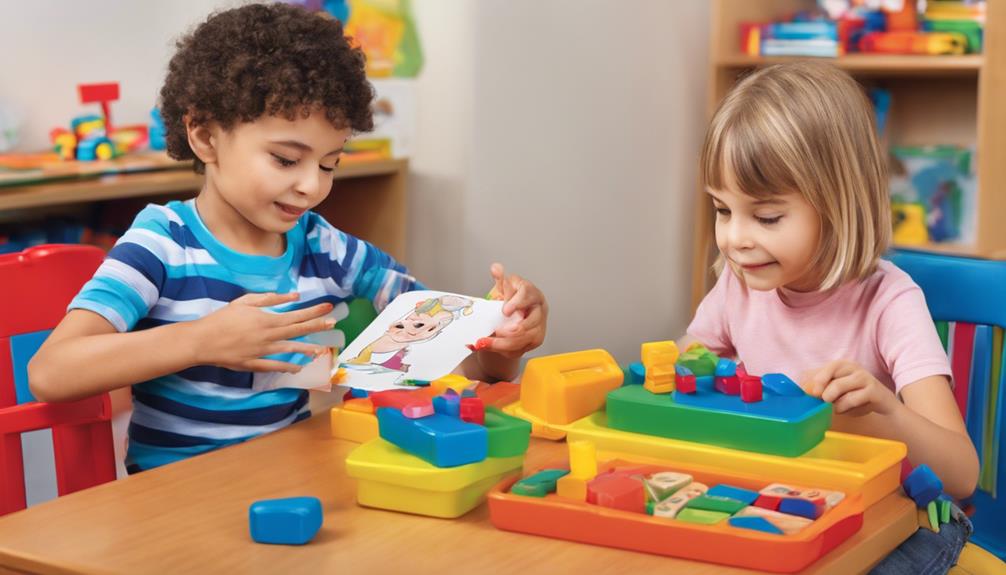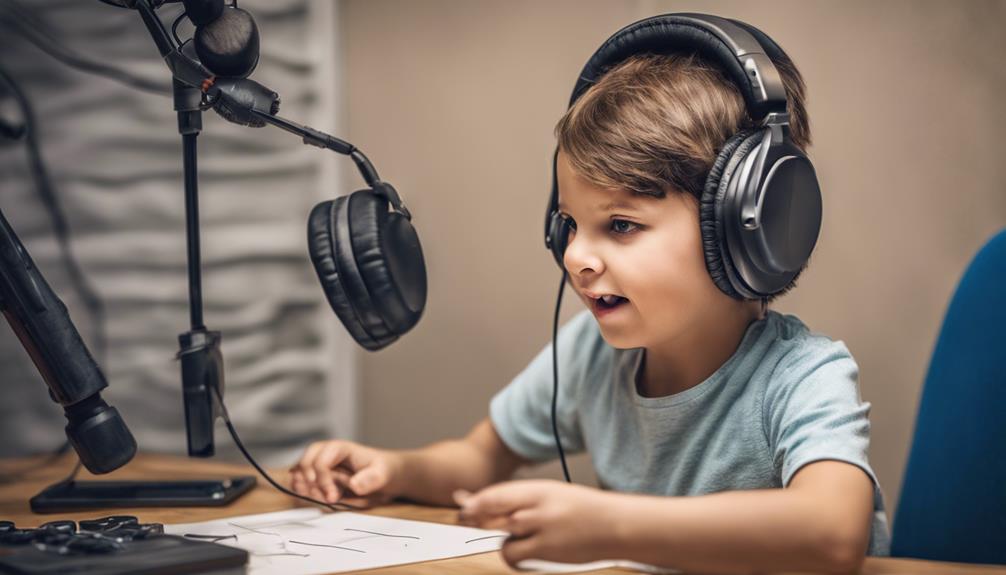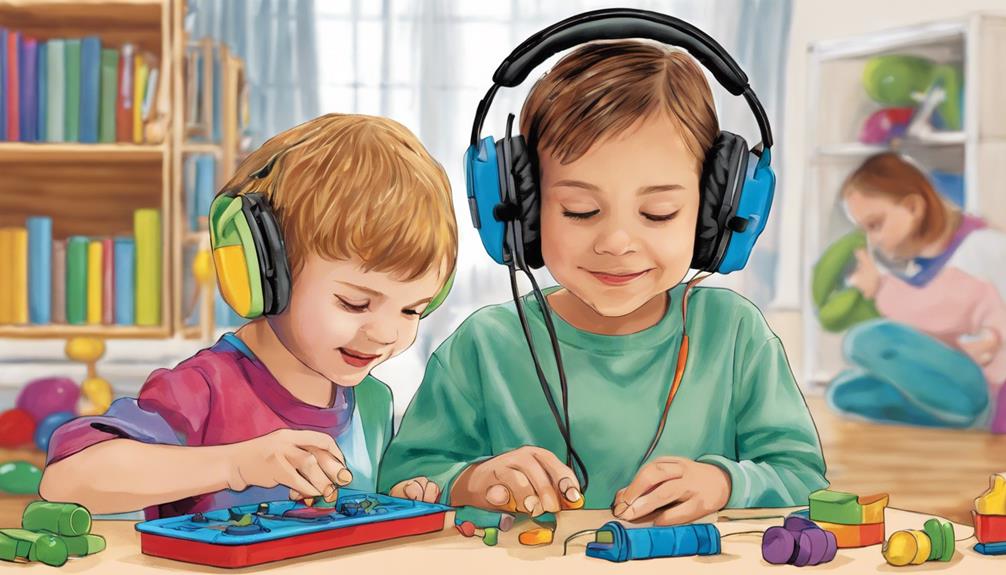When it comes to helping children excel in their academic journey, one key aspect often overlooked is the significance of setting effective auditory comprehension speech therapy goals. These goals play a vital role in shaping not just their learning abilities but also their social interactions and overall communication skills.
By understanding the intricacies of auditory processing and implementing targeted strategies, therapists can unlock a child's full potential. But how can these goals be crafted in a way that ensures impactful progress and lasting results?
Let's explore the nuanced world of setting auditory comprehension goals for children and the transformative impact they can have on their development.
Key Takeaways
- Tailored speech therapy goals enhance auditory comprehension skills effectively.
- Measurable goals track progress and provide a roadmap for support.
- Child-centered approach promotes engagement and empowerment in goal-setting.
- Addressing challenges like processing complex sentences improves listening abilities.
Importance of Auditory Comprehension Skills
Why are auditory comprehension skills crucial for children's communication and learning success?
Developing strong auditory comprehension is vital for children as it forms the foundation for effective communication, successful social interactions, and academic achievement.
The ability to listen attentively and understand spoken language plays a significant role in how children engage with others, follow instructions, and comprehend information in various settings.
For children, especially those with speech and language disorders, honing auditory comprehension skills through targeted speech therapy goals is essential.
By improving their listening abilities and enhancing their capacity to process and interpret spoken information, children can overcome communication barriers and actively participate in educational and social activities.
Speech therapy goals focusing on auditory comprehension not only help children follow directions accurately but also boost their confidence in engaging with peers and adults, leading to improved overall communication skills and academic success.
Strengthening auditory comprehension is a key stepping stone towards empowering children to navigate the complexities of verbal communication effectively.
Setting Meaningful Therapy Goals

When setting therapy goals for auditory comprehension, we understand the importance of specificity to target the child's listening challenges effectively.
By taking a child-centered approach, we can tailor goals to their unique needs, fostering progress in comprehension.
Tracking measurable outcomes allows us to gauge improvement and make necessary adjustments for continued growth.
Goal Specificity Importance
Setting specific auditory comprehension goals in speech therapy plays a vital role in effectively improving a child's listening skills. Specific goals help focus therapy sessions, track progress accurately, and tailor interventions to meet the child's unique needs. Clear and specific therapy goals provide a roadmap for therapists, parents, and educators to support the child's auditory comprehension development. Measurable and precise goals enable objective monitoring of the child's progress in understanding spoken language and following instructions.
- Specific goals focus therapy sessions
- Tracking progress accurately
- Tailoring interventions to meet unique needs
- Providing a roadmap for support from therapists, parents, and educators
Child-Centered Approach
In tailoring therapy goals for children, our focus remains on their unique needs and abilities to ensure meaningful and engaging progress in auditory comprehension skills. A child-centered approach is essential in creating tailored goals that address specific auditory comprehension challenges while considering the child's interests, strengths, and areas for growth.
By involving the child in goal-setting, we promote ownership, empowerment, and active participation in therapy sessions. Meaningful therapy goals aren't only relevant and achievable but also vital for supporting the child's progress and development in this crucial skill area.
Through this approach, we can ensure that therapy is effective, engaging, and focused on the individual child's journey towards improved auditory comprehension.
Measurable Progress Tracking
To effectively track progress in auditory comprehension speech therapy, we establish specific and measurable goals that reflect the child's listening skills development. When setting measurable goals for students in auditory comprehension therapy, consider these key points:
- IEP Integration: Align goals with the student's Individualized Education Program for a cohesive approach.
- Social Skills Enhancement: Include goals that promote social interaction through improved listening and understanding.
- Data Collection Methods: Use various tools like assessments, progress reports, and observations to track advancements.
- Goal Adjustment: Regularly review data to make necessary adjustments to therapy goals for optimal progress.
Understanding Auditory Processing
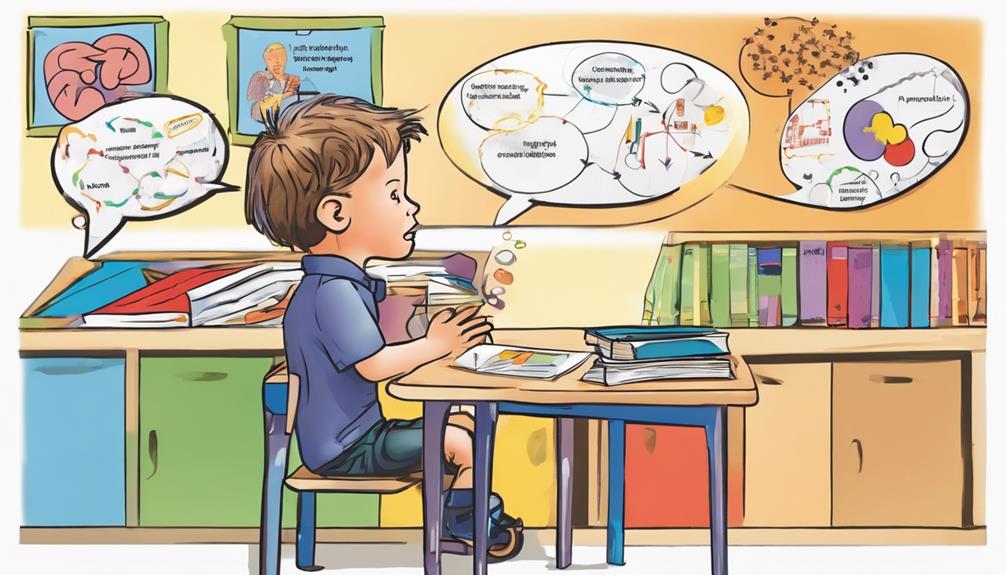
When it comes to understanding auditory processing, we need to grasp the basics, recognize common issues, and adopt strategies for improvement.
Auditory processing involves the brain's ability to interpret sounds, which can impact a child's language comprehension and academic success.
Auditory Processing Basics
Understanding auditory processing is crucial for comprehending how children interpret and make sense of sounds they hear. Auditory processing involves various skills essential for effective communication, such as:
- Auditory discrimination: The ability to differentiate between sounds.
- Auditory sequencing: The capacity to understand and recall the order of sounds.
- Auditory memory: Remembering information heard.
- Auditory integration: Combining different sounds to create meaning.
Common Auditory Issues
Experiencing auditory processing challenges can significantly impact a child's ability to effectively comprehend and engage with spoken language. These challenges can result in difficulties following directions, remembering information, and understanding conversations. Children with auditory processing issues may struggle to distinguish between similar sounds, have trouble with background noise, and misinterpret spoken information.
Such challenges not only affect academic performance but also impact social interactions and overall learning experiences. Speech therapy goals for addressing auditory comprehension aim to improve processing, discrimination, and understanding of spoken language to enhance communication skills. By focusing on these goals, children can develop the necessary skills to navigate the complexities of understanding spoken language and engage more effectively in various communication contexts.
Strategies for Improvement
To enhance auditory processing skills in children, incorporating visual aids, repetition, and multisensory approaches is crucial. When focusing on auditory processing, utilizing various strategies can significantly improve a child's ability to interpret and understand sounds effectively. Here are some key methods to consider:
- Visual aids: Using visual tools alongside auditory information can enhance comprehension.
- Repetition: Repeating auditory stimuli can help reinforce understanding and memory retention.
- Multisensory approaches: Engaging multiple senses simultaneously can strengthen auditory processing skills.
- Active listening: Encouraging attentive listening practices can improve the ability to process auditory information accurately.
Challenges in Auditory Comprehension

Navigating through the intricacies of auditory comprehension can pose significant challenges for children, impacting their ability to process complex information effectively. Students may encounter difficulties in processing complex sentences, following multi-step directions, and making quick inferences. Identifying main ideas, understanding supporting details, and efficiently processing information during listening tasks can also present challenges. These obstacles can have a direct impact on academic performance, affecting students' ability to follow classroom instructions and access curriculum content. Processing spoken language in real-time, keeping up with rapid conversations, and accurately interpreting auditory information can be particularly challenging for some children. Therefore, effective speech therapy goals should address these specific challenges through targeted interventions and strategies.
| Auditory Comprehension Challenges | Impact on Children |
|---|---|
| Processing complex sentences | Difficulty in understanding instructions |
| Following multi-step directions | Struggles with accessing curriculum content |
| Making quick inferences | Challenges in identifying main ideas |
| Identifying main ideas | Difficulty in understanding supporting details |
| Understanding supporting details | Impact on academic performance |
Impact on Communication Development

In understanding the impact on communication development, children's auditory comprehension skills play a crucial role in shaping their ability to engage effectively in various aspects of their daily interactions.
When it comes to children and their auditory comprehension skills, we must consider the following points:
- Auditory comprehension is fundamental for understanding spoken language, following instructions, and engaging in conversations.
- Strong auditory comprehension abilities support academic success, social interactions, and overall communication skills in children.
- Challenges in auditory comprehension can hinder a child's participation in classroom activities, comprehension of stories, and effective following of directions.
- Setting measurable speech therapy goals for auditory comprehension is essential for tracking progress, customizing interventions, and supporting children in developing crucial communication skills.
Tailoring Goals to Child's Needs

Assessing a child's current auditory comprehension skills and identifying areas for improvement is crucial in tailoring goals to meet their specific needs. By understanding the student's unique challenges and strengths, we can create individualized goals that focus on enhancing their auditory comprehension abilities.
These goals must be specific, measurable, and relevant to ensure effective progress tracking and intervention adjustments as needed. A tailored approach takes into account the child's age, language skills, and any underlying conditions that may impact their auditory comprehension.
Measurable Goal Setting Strategies

When setting measurable goals in auditory comprehension speech therapy, it's crucial to employ specific techniques for effective tracking of progress.
By using data-driven measurements like accuracy or speed, we can establish clear objectives to enhance a child's auditory comprehension skills.
These strategies provide a roadmap for therapists, parents, and educators to collaboratively work towards improving a child's ability to comprehend auditory information.
Goal Setting Techniques
Setting measurable goals in speech therapy enhances our ability to track progress effectively and tailor interventions for children's auditory comprehension development. When establishing measurable goals for children's auditory comprehension in speech therapy, consider the following techniques:
- Specific Targets: Set clear and precise goals related to auditory comprehension abilities.
- Quantifiable Benchmarks: Ensure goals are measurable to monitor progress accurately.
- Criteria for Achievement: Define specific criteria that indicate when a goal has been met.
- Adjustment Flexibility: Allow for modifications to therapy plans based on progress towards set goals.
Tracking Progress Effectively
As we focus on tracking progress effectively in auditory comprehension therapy, setting measurable goals remains pivotal for tailoring interventions and ensuring accurate monitoring of development. Measurable goal setting involves defining specific, observable outcomes to track progress in therapy sessions. Utilizing quantifiable measures such as accuracy percentages and response times enables clear monitoring of the child's auditory comprehension progress. Incorporating data collection methods like progress charts and checklists helps in objectively assessing and documenting advancements. These tools provide a structured way to evaluate the effectiveness of interventions and make necessary adjustments. By establishing clear and measurable goals, therapists can better support the child's auditory comprehension development and guide parents in understanding the progress made.
| Measurable Goal Setting | Auditory Comprehension Therapy |
|---|---|
| Quantifiable Measures | Data Collection Methods |
| Progress Charts | Therapy Sessions |
Enhancing Listening Abilities

Enhancing children's listening abilities through targeted interventions and strategies is crucial for improving their auditory comprehension skills. When focusing on enhancing listening abilities, it's essential to consider the following:
- Active Listening Exercises: Engaging children in activities that require focused listening can help sharpen their auditory skills.
- Setting Measurable Goals: Establishing clear and achievable objectives related to listening skills allows for effective progress tracking.
- Incorporating Social Interactions: Encouraging children to participate in conversations and group activities aids in developing their listening capabilities within different contexts.
- Supporting Academic Success: Strengthening listening skills contributes significantly to academic achievements and overall learning outcomes.
Promoting Academic Success

Improving children's auditory comprehension skills is integral to their academic success, facilitating better understanding of classroom instructions and access to curriculum content. By setting speech therapy goals that target auditory comprehension, children can enhance their main idea comprehension, ability to follow directions, and make inferences.
These skills are crucial for academic achievement, as they not only aid in understanding academic material but also contribute to improved performance in reading, writing, and overall learning outcomes. Addressing auditory comprehension challenges early on is key in preventing learning gaps and supporting children in meeting grade-level expectations.
Through specific and measurable goals, children can develop essential language processing skills that are fundamental for their academic advancement. By focusing on improving auditory comprehension, speech therapy can play a significant role in promoting academic success and empowering children to excel in their educational journey.
Improving Social Interaction Skills

Improving social interaction skills is key to fostering meaningful connections and effective communication.
We can work on role-playing scenarios that promote empathy and understanding in conversations.
Encouraging turn-taking can also help children navigate social interactions more smoothly.
Role-Playing for Empathy
Engaging in role-playing activities can significantly enhance children's social interaction skills by fostering empathy and perspective-taking. Role-playing allows children to step into different roles, promoting an understanding of others' emotions and viewpoints. This interactive method cultivates communication skills, emotional awareness, and the capacity to anticipate responses in social settings. Through role-play scenarios, children develop empathy, problem-solving abilities, and conflict resolution skills by experiencing various perspectives firsthand. These exercises create a safe space for children to practice and refine their social skills, leading to improved interactions with peers and adults.
- Promotes understanding of others' feelings and experiences
- Enhances communication skills and emotional awareness
- Develops empathy and problem-solving abilities
- Fosters conflict resolution skills through perspective-taking
Turn-Taking in Conversations
Stepping into the rhythm of conversation, children learn the art of turn-taking to harmonize interactions and deepen social connections. Turn-taking in conversations is crucial for developing social skills, enhancing listening comprehension, and improving communication abilities in children undergoing speech therapy.
By encouraging turn-taking, therapists help children understand the importance of active participation, mutual respect, and effective communication exchanges during conversations. This practice not only builds conversational fluency but also boosts social confidence and cooperative communication skills.
Through appropriate pauses and responses, children grasp the essence of balanced interactions, leading to enriched social engagement and reciprocity. Mastering turn-taking lays a strong foundation for successful and meaningful conversations, fostering positive social interactions and overall communication development.
Examples of Therapy Goals

In our therapy sessions, we aim to enhance children's understanding of main ideas and details in spoken language through targeted goals for auditory comprehension. Here are some examples of therapy goals we may set to achieve this:
- Improving the ability to follow multi-step directions accurately to enhance listening skills.
- Developing active listening strategies such as questioning, summarizing, and making connections to improve comprehension.
- Implementing guided practice through discussions, group activities, and audiobooks to support auditory comprehension development.
- Monitoring progress closely and adjusting therapy goals based on data collection and feedback for effective intervention.
These goals are carefully crafted to help children strengthen their auditory comprehension skills, enabling them to better grasp and process information presented to them verbally. By incorporating these objectives into our therapy sessions, we strive to support children in their journey towards improved communication and comprehension abilities.
SMART Approach in Goal Setting
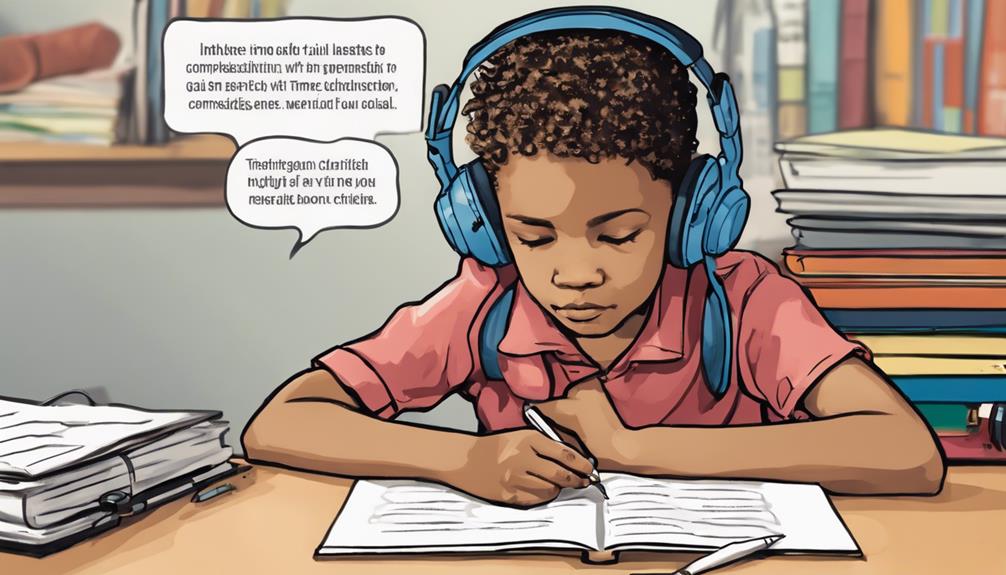
To effectively enhance children's auditory comprehension skills in speech therapy, we apply the SMART approach in goal setting, ensuring objectives are Specific, Measurable, Achievable, Relevant, and Time-bound.
Specific goals outline clear and well-defined targets directly related to improving auditory comprehension skills. Measurable goals enable progress tracking, allowing us to assess the child's advancement over time accurately. Achievable goals are set realistically, within the child's capabilities, fostering a sense of accomplishment.
Time-bound goals come with defined timelines for completion, ensuring timely progress monitoring and adjustments if necessary. By adhering to the SMART approach, we create a framework that promotes effective goal setting, progress tracking, and overall success in enhancing children's auditory comprehension skills.
This method not only helps in setting clear objectives but also provides a roadmap for continuous improvement and development. Through the SMART approach, we ensure that every step taken in therapy is purposeful and contributes significantly to the child's progress.
Collaborating With Parents and Therapists
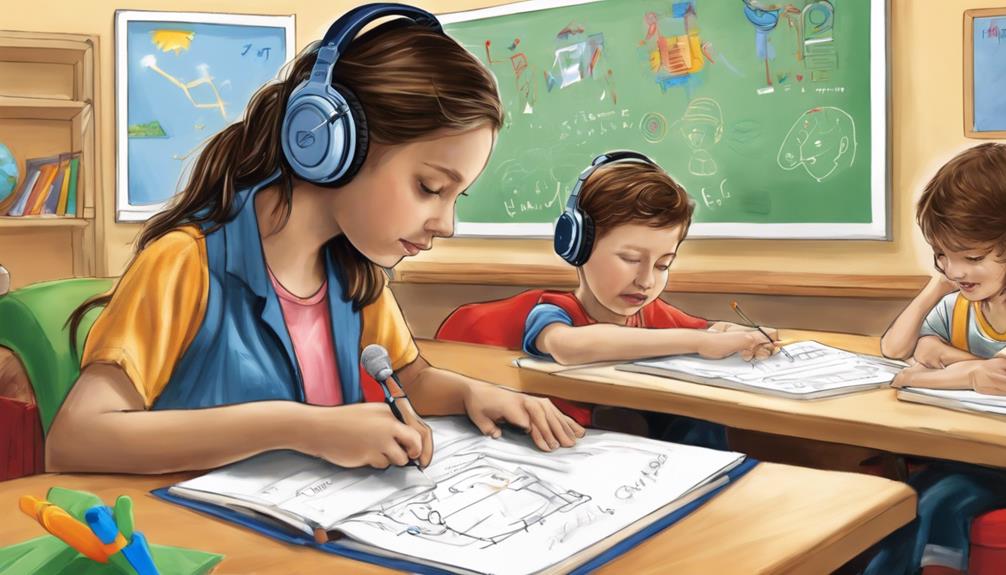
Collaborating with parents and therapists greatly enhances communication, support, and goal alignment for more effective therapy outcomes. When parents and therapists work together, it creates a strong foundation for the child's progress in therapy. Here are some key points to emphasize the importance of collaboration:
- Parental Involvement: Involving parents in therapy sessions fosters a holistic approach to addressing the child's needs and progress.
- Therapist Benefits: Therapists can benefit from parents' perspectives on the child's communication challenges and successes.
- Consistent Reinforcement: Parental involvement can lead to consistent reinforcement of therapy strategies and skills at home.
- Unified Goal-Setting: Joint goal-setting with parents and therapists promotes a unified and comprehensive approach to supporting the child's auditory comprehension development.
Monitoring Progress and Adjustments
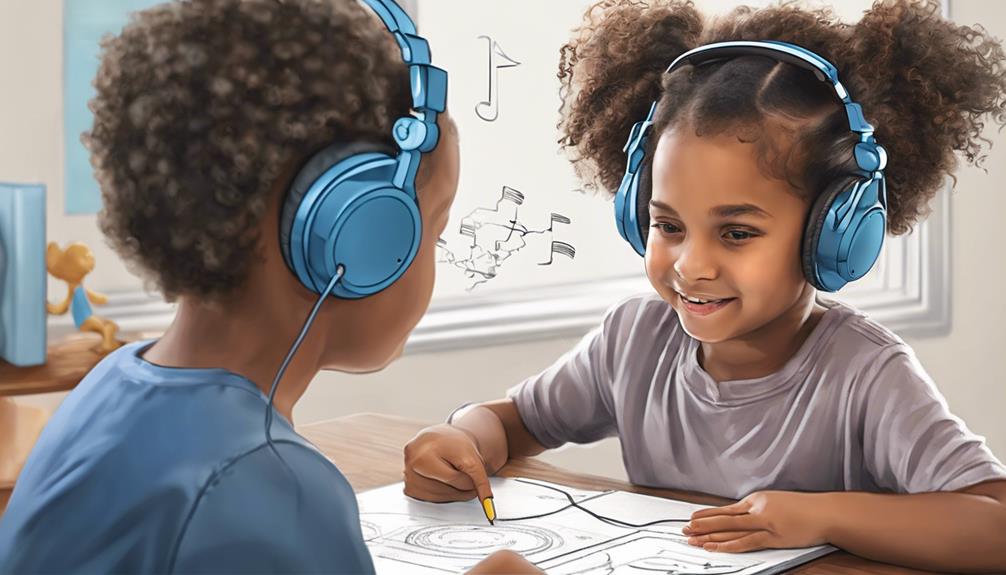
Regularly monitoring progress and making necessary adjustments are crucial steps in ensuring the effectiveness of auditory comprehension goals for children in speech therapy. Through ongoing assessments and feedback, we can track the child's development towards achieving auditory comprehension objectives.
These assessments provide valuable data that guide us in making informed decisions for goal adjustments, ensuring that the goals remain relevant and beneficial. Collaboration with parents and professionals is key in this process, as their insights and perspectives help tailor the goals to the child's specific needs.
Observations during therapy sessions also play a vital role, offering valuable insights that aid in fine-tuning auditory comprehension goals. By staying flexible and being open to adapting strategies and interventions based on the collected data, we can better support the child's progress.
Together, through a collaborative effort and a commitment to monitoring, assessing, and adjusting, we can help children reach their auditory comprehension goals effectively.
Resources for Support and Guidance

As we navigate the journey of setting auditory comprehension speech therapy goals for children, tapping into a variety of resources for support and guidance becomes essential.
Here are some key resources that can aid in this process:
- Professional Organizations: Organizations like ASHA offer guidance on effective goal setting.
- Online Platforms: Websites such as SpeechPathology.com provide resources, courses, and webinars for speech therapists.
- Collaboration: Working with other professionals and parents can offer valuable insights for tailored goals.
- Research-Based Strategies: Speech therapy textbooks and journals contain evidence-based strategies for designing appropriate goals.
Frequently Asked Questions
What Are the IEP Goals for Auditory Comprehension?
We focus on improving skills like:
- Recalling spoken words
- Following instructions accurately
- Retaining numbers
- Recalling syllables
- Reproducing sentences.
These goals help enhance a child's ability to understand and process auditory information effectively, crucial for listening, following directions, and participating in classroom activities.
Measurable IEP goals for auditory comprehension track progress and provide targeted interventions for improvement.
Setting specific auditory comprehension goals supports academic success and social-emotional development in children.
What Is an Example of a Listening Comprehension Goal?
Improving listening comprehension involves grasping main ideas and details in spoken language. Setting goals for following multi-step directions and using active listening strategies is key.
Strategies like questioning and summarizing aid in achieving these goals. Activities such as discussions and group work, as well as audiobooks, reinforce comprehension skills.
Regular progress monitoring and adjusting interventions based on data are essential for success in auditory comprehension goals.
What Are the Goals of Auditory Discrimination Speech Therapy?
When it comes to auditory discrimination speech therapy goals, our focus is on improving the ability to distinguish between different sounds.
We aim to enhance auditory processing skills by working on recognizing differences in pitch, tone, intensity, or phonemes.
By increasing accuracy in identifying subtle sound variations, we help in language development and listening comprehension.
Our activities and exercises are tailored to strengthen auditory discrimination abilities for better communication and language skills.
What Are the IEP Targets for Auditory Memory?
We focus on enhancing auditory memory by targeting the ability to recall spoken words, follow instructions accurately, and retain information. Our goals include repeating numbers, recalling syllables, and reproducing sentences accurately. These targets address deficits in memory skills like difficulty remembering information heard or following verbal directions effectively.
Strengthening listening skills is essential for success in academics and social interactions. Setting measurable goals supports children in developing crucial listening comprehension abilities.
Conclusion
In conclusion, setting effective auditory comprehension speech therapy goals for children is vital for their overall development.
By working collaboratively with parents and therapists, monitoring progress, and making adjustments as needed, we can ensure that each child reaches their full potential.
For example, I recently worked with a young boy who struggled to follow directions in the classroom. Through targeted therapy goals and consistent support from his parents and teachers, he made significant improvements in his listening skills and academic performance.

